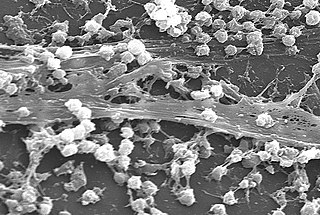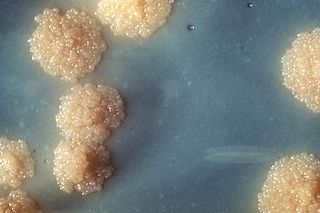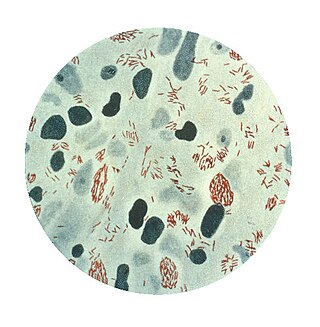Ashwani Kumar | |
|---|---|
| Born | New Delhi, India |
| Alma mater | University of Delhi & University of Alabama at Birmingham |
| Known for | Studies on Mycobacterium tuberculosis |
| Awards | Shanti Swarup Bhatnagar Prize for Science and Technology 2022. DBT/Wellcome Trust India Alliance Senior Fellowship (2021 to 2026). 2017–18 N-BIOS Prize. 2016 DST Swarnajayanti Fellowship |
| Scientific career | |
| Fields | |
| Institutions | |
| Doctoral advisor | Prof. Vani Brahmachari and Prof. Mridula Bose |
Ashwani Kumar is an Indian microbiologist and the senior principal scientist at the Institute of Microbial Technology (ImTech). He is known for his studies on Mycobacterium tuberculosis, the causative agent of tuberculosis. His laboratory focuses on understanding the reasons for drug tolerance observed in humans. His laboratory hypothesizes that tuberculosis is a biofilm infection, so its treatment needs the administration of multiple drugs for at least six months. The Department of Science and Technology has awarded him Swarnajayanti Fellowship for 2016–2017. Department of Biotechnology has awarded him the National Bioscience Prize (2017-18). He was also selected for DBT/Wellcome Trust India Alliance Senior Fellowship (2021 to 2026). He was elected as a Fellow of the National Academy of Sciences, India, in 2022. For his contributions in tuberculosis pathogenesis, he was awarded with Shanti Swarup Bhatnagar Prize for Science and Technology 2022. He is considered as one of India's Leading Scientist in the field of Tuberculosis and his lab is doing some of the best research in India.
Ashwani Kumar is a senior principal scientist at the Institute of Microbial Technology (ImTech) [1] where he heads a laboratory, popularly known as Ashwani Kumar's Lab. [2] and serves as a principal investigator. [3] He is known to have done extensive research on Mycobacterium tuberculosis and has served as a member of MDRIpred project, [4] an open source server for predicting inhibitors against drug-tolerant M.tb H37Rv. [5] He has published a number of articles; [6] ResearchGate, an online repository of scientific articles has listed 31 of them. [7] His laboratory has demonstrated the presence of cellulose encased biofilms [8] inside the hosts including human. [9] He also works on regulation of autophagy by signalling gases such as carbon monoxide [10] and hydrogen sulfide. [11] The Department of Biotechnology of the Government of India awarded him the National Bioscience Award for Career Development, one of the highest Indian science awards, for him contributions to biosciences, in 2017–18. [12]

A biofilm is a syntrophic community of microorganisms in which cells stick to each other and often also to a surface. These adherent cells become embedded within a slimy extracellular matrix that is composed of extracellular polymeric substances (EPSs). The cells within the biofilm produce the EPS components, which are typically a polymeric combination of extracellular polysaccharides, proteins, lipids and DNA. Because they have a three-dimensional structure and represent a community lifestyle for microorganisms, they have been metaphorically described as "cities for microbes".

Mycobacterium tuberculosis, also known as Koch's bacillus, is a species of pathogenic bacteria in the family Mycobacteriaceae and the causative agent of tuberculosis. First discovered in 1882 by Robert Koch, M. tuberculosis has an unusual, waxy coating on its cell surface primarily due to the presence of mycolic acid. This coating makes the cells impervious to Gram staining, and as a result, M. tuberculosis can appear weakly Gram-positive. Acid-fast stains such as Ziehl–Neelsen, or fluorescent stains such as auramine are used instead to identify M. tuberculosis with a microscope. The physiology of M. tuberculosis is highly aerobic and requires high levels of oxygen. Primarily a pathogen of the mammalian respiratory system, it infects the lungs. The most frequently used diagnostic methods for tuberculosis are the tuberculin skin test, acid-fast stain, culture, and polymerase chain reaction.

Mycobacterium is a genus of over 190 species in the phylum Actinomycetota, assigned its own family, Mycobacteriaceae. This genus includes pathogens known to cause serious diseases in mammals, including tuberculosis and leprosy in humans. The Greek prefix myco- means 'fungus', alluding to this genus' mold-like colony surfaces. Since this genus has cell walls with a waxy lipid-rich outer layer containing high concentrations of mycolic acid, acid-fast staining is used to emphasize their resistance to acids, compared to other cell types.

Mycobacterium leprae is one of the two species of bacteria that cause Hansen's disease (leprosy), a chronic but curable infectious disease that damages the peripheral nerves and targets the skin, eyes, nose, and muscles.

Isoniazid, also known as isonicotinic acid hydrazide (INH), is an antibiotic used for the treatment of tuberculosis. For active tuberculosis, it is often used together with rifampicin, pyrazinamide, and either streptomycin or ethambutol. For latent tuberculosis, it is often used alone. It may also be used for atypical types of mycobacteria, such as M. avium, M. kansasii, and M. xenopi. It is usually taken by mouth, but may be used by injection into muscle.

In cell biology, a phagosome is a vesicle formed around a particle engulfed by a phagocyte via phagocytosis. Professional phagocytes include macrophages, neutrophils, and dendritic cells (DCs).

Vojo Deretic, is distinguished professor and chair of the Department of Molecular Genetics and Microbiology at the University of New Mexico School of Medicine. Deretic was the founding director of the Autophagy, Inflammation and Metabolism (AIM) Center of Biomedical Research Excellence. The AIM center promotes autophagy research nationally and internationally.

Acetobacter aceti, a Gram-negative bacterium that moves using its peritrichous flagella, was discovered when Louis Pasteur proved it to be the cause of conversion of ethanol to acetic acid in 1864. Today, A.aceti is recognized as a species within the genus Acetobacter, belonging to the family Acetobacteraceae in the class Alphaproteobacteria. Its bacterial motility plays an important role in the formation of biofilms, intricate communities where A. aceti cells aggregate and collaborate, further enhancing their ability to metabolize ethanol and produce acetic acid. Widely distributed in various environmental niches, this benign microorganism thrives in habitats abundant in fermentable sugars, such as flowers, fruits, honey, water, and soil, present wherever sugar fermentation occurs. A. aceti grows best within temperatures ranging from 25 to 30 degrees Celsius, with an upper limit of 35 degrees Celsius, and in slightly acidic conditions with a pH between 5.5 to 6.3. A. aceti has long been used in the fermentation industry efficiently producing acetic acid from alcohol as an obligate aerobe dependent on oxygen as the terminal electron acceptor. A. aceti, classified as an acidophile, able to survive in acidic environments, possesses an acidified cytoplasm, providing most proteins with acid stability. The microorganism's ability to thrive in environments rich in fermentable sugars shows its potential as an organism for studying microbial metabolism and adaptation.

The universal stress protein (USP) domain is a superfamily of conserved genes which can be found in bacteria, archaea, fungi, protozoa and plants. Proteins containing the domain are induced by many environmental stressors such as nutrient starvation, drought, extreme temperatures, high salinity, and the presence of uncouplers, antibiotics and metals.
Brahm Shanker Srivastava is an Indian microbiologist, inventor and a former deputy director and head of Microbiology division of the Central Drug Research Institute. He is the founder of Biotech Research, a non-profit non governmental institution promoting research in the field of biotechnology and is a director of Nextec Lifesciences Private Limited, a start up involved in biomedical products and research applications. He is known for his researches on microbial genetics and is an elected fellow of the National Academy of Sciences, India.
Pradip Kumar Chakraborti is an Indian molecular biologist, biochemist was the Chief scientist at Institute of Microbial Technology (IMTECH), a constituent institution of the Council of Scientific and Industrial Research and presently a Professor in the Department of Biotechnology at School of Chemical and Life Sciences in Jamia Hamdard, New Delhi. Known for his studies on Prokaryotic signal transduction, Chakraborti is an elected fellow of all three Science Academies in India the National Academy of Sciences, India, Indian Academy of Sciences and the Indian National Science Academy. His studies have been documented by way of a number of articles and ResearchGate, an online repository of scientific articles, has listed 98 of them. Besides, he has also contributed chapters to books edited by others. The Department of Biotechnology of the Government of India awarded him the National Bioscience Award for Career Development, one of the highest Indian science awards, for his contributions to biosciences in 2001.
Vinay Kumar Nandicoori is an Indian immunologist, biotechnologist and currently the director of Centre for Cellular and Molecular Biology, India. He is known for his studies on the kinase-mediated signaling networks in Mycobacterium tuberculosis, the causative pathogen of tuberculosis. Holder of a master's degree in biotechnology from the Indian Institute of Technology, Bombay and a PhD from the Indian Institute of Science, Nandicoori did his post doctoral work the University of Virginia and Texas A & M University.
Ravishankar Ramachandran is an Indian molecular biologist and a senior principal scientist at the department of molecular and structural biology of the Central Drug Research Institute. Known for his studies on the molecular mechanisms of human pathogens such as Mycobacterium tuberculosis, Ramachandran is a DBT-nominated member of the Institutional Bio-Safety Committee of Babasaheb Bhimrao Ambedkar University. His studies have been documented by way of a number of articles and ResearchGate, an online repository of scientific articles has listed 142 of them. The Department of Biotechnology of the Government of India awarded him the National Bioscience Award for Career Development, one of the highest Indian science awards, for his contributions to biosciences, in 2010.
Dibyendu Sarkar is an Indian biochemist, molecular microbiologist and a Chief Scientist at the Institute of Microbial Technology. He is known for his studies on Mycobacterium tuberculosis (Mtb), the bacterial pathogen causing the disease of tuberculosis. His studies have been documented by way of a number of articles and Google Scholar, an online repository of scientific articles has listed 23 of them. He has also delivered invited speeches which included the Second Annual Meeting on Infectious Diseases held at the Indian Institute of Science in September 2017. He is an elected member of Guha Research Conference and a recipient of the Raman Research Fellowship of the Council of Scientific and Industrial Research. The Department of Biotechnology of the Government of India awarded him the National Bioscience Award for Career Development, one of the highest Indian science awards, for his contributions to biosciences, in 2011.
Dr. Fayaz Ahmad Malik is an Indian pharmacologist, cancer biologist and a scientist at the Indian Institute of Integrative Medicine of the Council of Scientific and Industrial Research. He is known for his studies on investigating the regulatory mechanisms of Cancer Stem Cells during tumor metastasis. His studies also involve the identification of signaling networks conferring resistance to current anti-cancer therapies. His discovery of new anticancer agents holds a number of patents for the processes he has developed. The Department of Biotechnology of the Government of India awarded him the National Bioscience Award for Career Development, one of the highest Indian science awards, for his contributions to Biosciences, in 2014.
Pawan Gupta is an Indian biotechnologist, immunobiologist, cell biologist and a senior principal scientist at the Institute of Microbial Technology of the Council of Scientific and Industrial Research. He is known for his studies on Nuclear Receptors in Chronic Inflammatory Disorders and host-pathogen interaction of Mycobacterium tuberculosis. His studies have been documented by way of a number of articles and ResearchGate, an online repository of scientific articles has listed 66 of them. The Department of Biotechnology of the Government of India awarded him the DBT IYBA Award in 2009 and National Bioscience Award for Career Development, one of the highest Indian science awards, for his contributions to biosciences, in 2015.
Amit Singh is an Indian microbiologist and an associate professor at the Department of Microbiology and cell biology of the Indian Institute of Science. A Wellcome-DBT Senior Fellow, Singh is known for his studies on the pathogenesis of Mycobacterium tuberculosis. His research focuses on exploring the mechanisms behind the persistence of human pathogens like disease and HIV.
Prabhu B. Patil is an Indian bacterial geneticist and a senior scientist at the Institute of Microbial Technology. Known for his studies on bacterial genetics, genomics and metagenomics, Patil has published his research findings by way of a number of articles; ResearchGate, an online repository of scientific articles has listed 95 of them. The Department of Biotechnology of the Government of India awarded him the National Bioscience Award for Career Development, one of the highest Indian science awards, for his contributions to biosciences, in 2017–18.
Mycolicibacterium agri is a species of bacteria from the phylum Actinomycetota that was first isolated from soil. It is non-pigmented and grows rapidly at 25–45 °C on Ogawa egg medium. It has also been isolated from a human skin infection, and raw milk M. agri is capable of degrading octocrylene.
Pratyoosh Shukla is an Indian Microbiologist specialized in Enzyme technology and Protein Bioinformatics. He is presently working as Professor and Coordinator of the School of Biotechnology at the Institute of Science, Banaras Hindu University, Varanasi, India. He was awarded with Indo-USA Research Professor at Department of Environmental Health, College of Medicine, University of Cincinnati, USA in the year 2014 by American Society of Microbiology (ASM) and Indo-U.S. Science and Technology Forum (IUSSTF). He is Fellow of National Academy of Agricultural Sciences (FNAAS), Fellow of Academy of Microbiological Sciences (FAMSc/FAMI), Fellow of Biotech Research Society of India (FBRS).